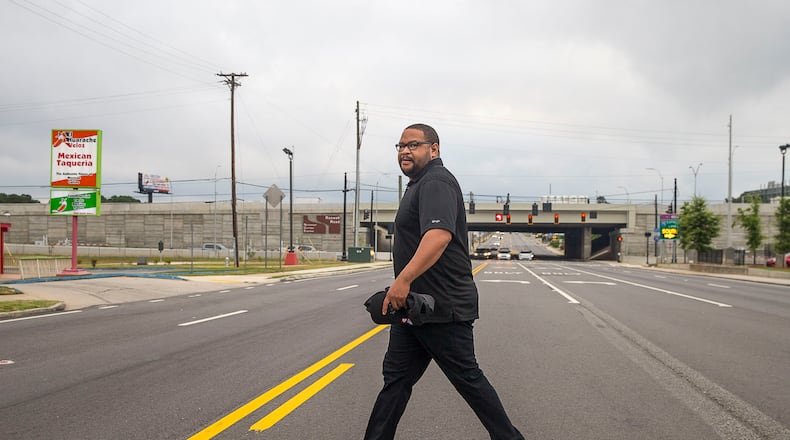Thomas Williams woke up early on a recent morning for his first day of work.
The first day of work has grown quite common for him.
There was the first day as a financial planner in 2013.
The first day as an investment analyst in 2017.
Now in 2019, the 35-year-old Virginian with a bachelor’s degree from Virginia Tech and a master’s in finance from the University of Georgia was taking a Cobb County bus to his latest job — flipping burgers at Wendy’s.
“I had to do it, because I needed to do something,” Thomas said.
The unemployment rate for African Americans, at 6%, is reaching historic lows. President Donald Trump often touts the rate at rallies to try to sway black voters heading into the 2020 election.
» RELATED: Lowest unemployment rate in half a century? Not in Atlanta
» MORE: Top cities for African-Americans economically
But the rate is still roughly double that of white Americans. It is a gap that has remained constant for more than half a century, through Republican and Democratic White Houses, Vietnam, the tech bubble, the Great Recession and now the longest jobs expansion on record.
The gap is even wider in Atlanta, celebrated for decades as a “Black Mecca” and “the city of black professionals.” The city’s jobless rates were 11.5% for black residents and 2.5% for white residents in 2017, the most recent year of comparative data, according to the Brookings Institution.
The nearly five-fold gap was only exceeded by Washington, D.C. among U.S. cities with 100,000 or more working-age people, according to an Atlanta Journal-Constitution analysis of Census data.
“We are still not in a place where we should be celebrating,” said Andre Perry, a Brookings fellow. “Put it this way, if these numbers reflected whites, they would be up in arms. When you look under the hood, blacks are still in a recession.”
African Americans trail their white counterparts not only in access to jobs, but also high-paying ones.
So Williams, who lost his car and apartment in 2017, rides the bus.
“I did what I was taught to do. I went to college, got educated and worked hard to make something of myself,” Williams said. “I want to further myself, work in my field and have an impact on society, but it is tough. What did I do wrong?”
Structural racism?
The jobless rate for African Americans has declined steadily since the Great Recession from a high of 16.8% in March 2010. But the improvement is relative.
The U.S. black jobless rate of 6.0% last month was nearly double the overall unemployment rate of 3.7%, according to the Bureau of Labor Statistics. African Americans are less likely to have jobs than Hispanics (4.3%), whites (3.3%) and Asians (2.1%). In 2018, more than one in five black teenagers were unemployed, almost double that of whites.
“There has been a 10-year recovery and the gap has not closed,” said Olugbenga Ajilore, a senior economist at The Center for American Progress. “We need to be focusing on the fact that structural racism is underlying all of this. We need to acknowledge, then combat, that. There is nothing about being black that makes you less employable.”
Economists and scholars point to issues like the criminal justice system, K-12 education, access to higher education and housing — all areas where African Americans still lack equality — as contributing factors. Those disparities don’t just influence jobless numbers, but also the quality of jobs and the even-larger gaps in wealth between black and white Americans.
Devon Sumbry, a 25-year-old graduate of Pebblebrook High School in Mableton, couldn’t afford college and now can’t break into the tech field, where he wants to be a game developer. So he bounces between minimum wage jobs.
Right now, he is a crew leader at a movie theater. It’s his fourth job, not including freelance gigs, since high school.
“I have a job, but I don’t wake up in the morning and jump for joy,” Sumbry said. “It is hard to work on the things you want to when you have to work on the things you have to.”
In 2016, the median wealth for an African American household was one-tenth that of whites – $17,100 compared with $170,810, according to the Pew Research Center.
Even African American households with a college degree had only $68,200 in wealth compared with $398,170 for white households.
“When Trump talks about how great the job numbers are for blacks, he is talking about the vast number of people who have the lowest-paying jobs,” said Bob Holmes, an Atlanta political scientist and former state representative. “You can be employed, but if you are making $8 an hour, that job doesn’t allow you to live a life where you can improve your situation.”
Former NFL player struggles to regain footing
Williams, the fast-food worker, said when he graduated from UGA in 2013, he should have been making between $60,000 and $65,000 based on the market and the job. But he started out making $40,000.
“It poses the question,” he said. “Was it even worth going to school?”
That is what Maurice Harrell is thinking.
He has been out of work since November. A former senior manager at Home Depot, Harrell recently went back to school to get a master’s degree in sports management.
He assumed that with his years working for a Fortune 500 company, coupled with the fact that he played football at the University of Georgia and briefly with the San Diego Chargers, he would find a job in somebody’s athletic department.
The 47-year-old spends his mornings working out and his afternoons applying for jobs. He said he has called every college in Atlanta with an athletic program and hasn’t gotten a sniff.
“I am willing to work my way up from the bottom,” Harrell said. “Not getting the phone calls has been the most disappointing.”
When he re-entered the job market, Harrell had saved enough to last about six months. He is giving himself until the end of July to find something in sports. If he comes up empty, he expects to find work in logistics.
North Carolina transplant still searching for Black Mecca
Finding a job in Atlanta is supposed to be easy. At least that is the perception of a city run by black politicians, many of them educated at historically black colleges.
It is a city where rappers and movie star sightings in their Lamborghinis are as natural as having a black doctor, lawyer or CEO walking next to you on the Beltline.
“The first time I visited Atlanta was in 1994 and this was the place to be,” said Dionne A. Hampton, a North Carolina native. “So many black people were living in these nice homes in places like Stone Mountain. Everybody was in real estate or retiring early. The Olympics were coming. Atlanta was the Black Mecca.”
But there is more behind the glitz.
» RELATED: Atlanta adds jobs, but unemployment up
» OPINION: Trump is reason for drop in blacks’ unemployment
In the five-year period ending in 2017, the overall jobless rates in the city of Atlanta were 3.1% for white residents but 15.5% for black residents, according to The Atlanta Journal-Constitution, based on American Community Survey data.
The jobless rate in all of Georgia for African Americans during that same period was lower, at 11.5%, although it was still considerably higher than for whites.
Comparative data going further back in time for Atlanta are harder to track. However, the gap in Fulton County has persisted for decades. In 1970, the county’s unemployment rates for whites and blacks were 2.6% and 4.5%, respectively. In 2010, the rates were 7.3% and 20%, respectively, according to the University of Minnesota IPUMS USA.
Holmes, a retired political science professor at Clark Atlanta University, said the Black Mecca image has always been fraught. He published an annual report, “Status of Black Atlanta,” between 1993 and 2005. Nothing, he said, has changed.
“Everything is relative,” said Holmes, who served in Georgia’s House for 34 years. “It was never a reality, it was all public relations.”
Holmes said many of Atlanta’s jobs are in low-paying service industries like fast food and conventions, and that more black Atlantans work those jobs than high-paying ones. Eventually, he said, “a lot of folks just drop out of the labor force.”
Hampton, the North Carolina native, finally moved to Atlanta in 2004 from Winston-Salem with a degree in business administration in hand and a nice job as a senior accountant at a large manufacturing firm.
“When I got here, there was a lot of networking and I had everything going for me,” said Hampton, who also interned in the Clinton White House in 1994 in the Office of Presidential Personnel. “I thought, ‘This is it,’ but it really wasn’t.”
Hampton’s last job — which she got and lost through a series of re-organizations — was in 2013 as a recycling analyst for Coca-Cola. Since then, she has been working on a series of contracting jobs, usually in finance or project management. She hasn’t had a contract since April.
“I have been applying for permanent positions all of this time. But the hard part is so has everyone else,” said Hampton. “I am just one of 10,000 resumes out there. It is very discouraging.”
Extended-stay motel without a car
The path that Williams set for himself veered for good in 2016 when he lost his job as a stock broker. As he waited for something to happen, he started driving for Uber and Lyft.
Then he worked as a seasonal department store cashier. He followed that with a seasonal stint lifting boxes and loading trucks in a warehouse. He answered phones at a call center.
But when finance jobs didn’t come, he got evicted from his apartment and had his car repossessed, costing him his ride-sharing gig.
The Hokie and Bulldog is still trying to find a job in finance while living in an extended-stay motel.
Until then, he does odd labor day jobs like cleaning hotel rooms.
And rides the bus to flip burgers.
“I never thought my life would be like this. It has been frustrating and disheartening,” Williams said. “I am qualified, experienced, educated and have had leadership roles. And I can’t even get a job interview.”
John Perry contributed to this report.
WHY IT MATTERS:
The U.S. unemployment rate for African Americans, at 6%, is near record lows after a years-long hiring boom. But that is still about double the rate for white Americans, a decades-long disparity that has persisted through economic boom and bust. And the gap is even wider in Atlanta, despite the city’s reputation as a “Black Mecca.”
Keep Reading
The Latest
Featured








